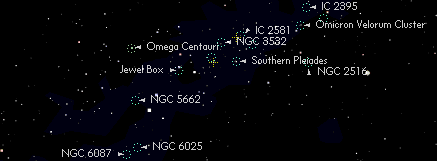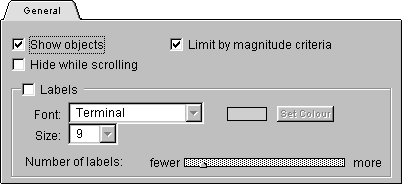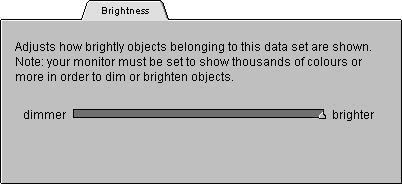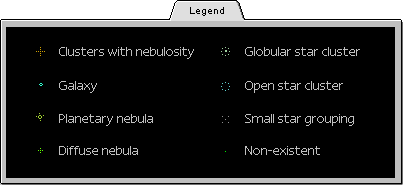|

These objects include groups of stars, galaxies, and
nebula that have been catalogued by astronomers into various
lists such as the New General Catalog (NGC), and the Index
Catalog (IC). Starry Night displays thousands of these
objects. You can toggle them on or off by clicking NGC/IC on
the Display Palette or by selecting it from the Display
menu.
The NGC/IC objects can be toggled on and off via the
Display menu or palette.
NGC/IC Options
To change the number and manner in which the NGC/IC
objects are shown in Starry Night open the Options dialog by
selecting "Options..." from the Settings menu, then pick
"NGC/IC" from the popup menu. Alternatively, click the
options button for the
NGC/IC objects in the Display palette.
The folder tabs allow you to adjust several aspects of
the over 10,000 deep sky objects displayed by Starry
Night.

Show Objects: Checking this box allows Starry
Night to display the objects in this data set.
Hide While Scrolling: To improve performance, you
can check this box so that the objects in this data set are
turned off while scrolling.
Limit by Magnitude Criteria: If checked will use
the settings from the magnitude dialog box. If unchecked,
all the objects will be displayed irrespective of
brightness.
Labels: Checking this box allows you to adjust the
font and font size of the object's names using popup menus,
as well as selecting the color of the labels.
Number Of Labels: This slider adjusts the total
number of named stars that are displayed in the current
window.

The slider adjusts how brightly objects belonging to the
data set are shown.
- Note: Your monitor must be set
to show thousands of colors or more in order to use the
slider.

This folder displays a PICT image of the current data
set's legend.
- Note: The objects marked as
"Non-existent" are the result of plate defects or other
photographic flaws that were misinterpreted at the time
that the NGC data base was compiled. Contemporary
observations have revealed no objects in these
positions.
|
